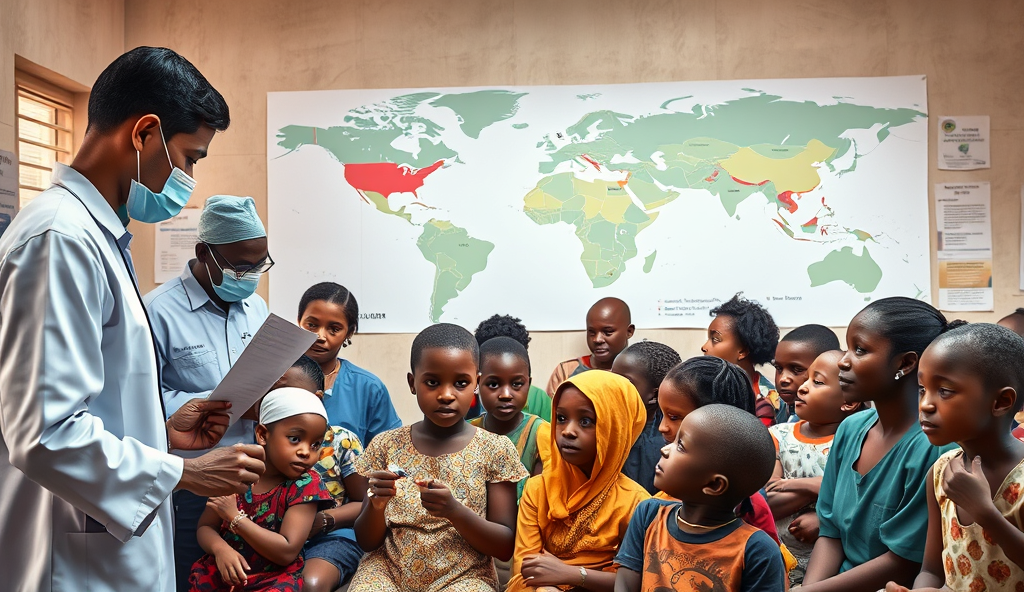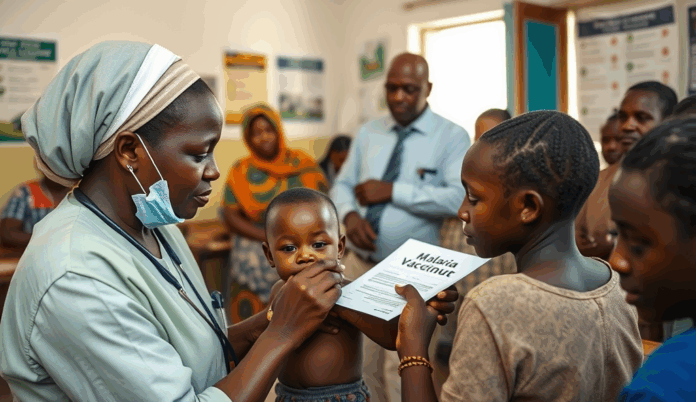Introduction to Malaria Vaccine Rollout in Nigeria
Nigeria’s malaria vaccine rollout marks a pivotal moment in the country’s fight against the disease, which claims over 200,000 lives annually, mostly children under five. The RTS,S vaccine, approved by WHO in 2021, is being integrated into Nigeria’s immunization program alongside existing prevention measures like insecticide-treated nets.
Initial pilot programs in states like Kebbi and Bayelsa have shown promising results, with vaccination coverage reaching over 70% in targeted communities. This phased approach ensures lessons from early implementation inform broader distribution across Nigeria’s 36 states.
As the rollout expands, parents can expect clearer timelines for vaccine availability, addressing one of the most pressing questions in malaria prevention efforts in Nigeria. The next section will delve into the current status of malaria vaccine development and its implications for Nigerian families.
Key Statistics

Current Status of Malaria Vaccine Development
Nigeria’s malaria vaccine rollout marks a pivotal moment in the country’s fight against the disease which claims over 200000 lives annually mostly children under five.
Building on Nigeria’s phased rollout of the RTS,S vaccine, global research continues to advance with promising new candidates like R21/Matrix-M, which showed 75% efficacy in phase 3 trials. These developments could expand Nigeria’s malaria prevention toolkit, complementing existing measures like insecticide-treated nets and the current vaccination program.
The WHO’s 2023 recommendation of a second malaria vaccine (R21) offers Nigeria potential flexibility in scaling up immunization efforts, particularly for hard-to-reach regions. Local researchers at institutions like the Nigerian Institute of Medical Research are also contributing to vaccine development, ensuring solutions are tailored to the country’s specific malaria strains.
As Nigeria evaluates these advancements, parents should stay informed about how new vaccines may integrate with the ongoing RTS,S rollout. The next section will explore the approval process guiding these decisions, clarifying how vaccines reach Nigerian communities.
Approval Process for Malaria Vaccine in Nigeria
The WHO’s 2023 recommendation of a second malaria vaccine (R21) offers Nigeria potential flexibility in scaling up immunization efforts particularly for hard-to-reach regions.
Nigeria’s malaria vaccine approval follows a rigorous pathway involving the National Agency for Food and Drug Administration and Control (NAFDAC), which evaluates safety and efficacy data from global trials alongside local research. For instance, the RTS,S vaccine underwent 18 months of review before being approved for Nigeria’s phased rollout, aligning with WHO recommendations and local health priorities.
The process also includes consultations with the National Primary Health Care Development Agency (NPHCDA) to assess distribution feasibility, particularly for high-burden states like Kano and Lagos. Once approved, vaccines are integrated into Nigeria’s Expanded Programme on Immunization, ensuring alignment with existing childhood vaccination schedules and malaria prevention efforts.
With the WHO’s 2023 endorsement of R21, Nigeria’s approval timeline may accelerate, though local adaptation studies remain critical. Parents can expect clearer updates on availability as these evaluations progress, bridging the gap between global advancements and community access.
Expected Timeline for Malaria Vaccine Availability
Nigeria’s malaria vaccination program will initially target children aged 5-17 months mirroring WHO recommendations for the RTS,S vaccine with plans to expand to older children as supply stabilizes.
Following NAFDAC’s approval process, Nigeria’s malaria vaccination program is projected to begin phased implementation in late 2024, prioritizing high-burden states like Kano and Lagos based on NPHCDA’s distribution plans. The RTS,S vaccine rollout, modeled after Ghana’s 2019 pilot, will likely span 12-18 months to ensure cold chain logistics and healthcare worker training are optimized.
With WHO’s 2023 endorsement of R21, Nigeria may fast-track approvals, potentially introducing a second vaccine option by mid-2025 pending local adaptation studies. Health authorities anticipate integrating both vaccines into routine immunization schedules alongside existing interventions like insecticide-treated nets in alignment with the National Malaria Elimination Programme.
Parents should monitor announcements from state primary healthcare centers, as timelines may vary—urban areas could see earlier access due to infrastructure advantages, while rural zones may follow in subsequent phases. This staggered approach ensures equitable distribution before discussing which age groups will benefit most from vaccination.
Target Age Group for Malaria Vaccination
The malaria vaccine rollout in Nigeria offers life-saving protection reducing severe malaria cases by 30% in clinical trials and preventing 4 in 10 infections among vaccinated children.
Nigeria’s malaria vaccination program will initially target children aged 5-17 months, mirroring WHO recommendations for the RTS,S vaccine, with plans to expand to older children as supply stabilizes. This aligns with global evidence showing peak vulnerability to severe malaria in early childhood, particularly in high-transmission regions like northern Nigeria.
Health authorities may adjust age eligibility when introducing the R21 vaccine, potentially covering children up to 36 months based on Ghana’s implementation model. Parents in priority states like Kano should expect detailed age-specific guidelines during the phased rollout announced by primary healthcare centers.
The staggered distribution strategy ensures younger cohorts receive protection first before discussing how the malaria vaccine will reach different communities through Nigeria’s immunization infrastructure.
How the Malaria Vaccine Will Be Distributed
Despite the proven benefits of Nigeria’s malaria vaccination program maintaining the cold chain for the RTS,S vaccine remains a critical hurdle especially in rural areas like Kebbi where electricity access is below 40%.
Nigeria’s malaria vaccination program will leverage existing immunization infrastructure, with doses administered through primary healthcare centers and outreach campaigns in high-burden states like Kano and Sokoto. The phased rollout prioritizes rural clinics serving vulnerable populations, following the successful model used for routine childhood vaccines under the National Primary Health Care Development Agency.
Cold chain systems will transport RTS,S and R21 vaccines to maintain potency, using the same temperature-controlled networks that distribute polio and measles vaccines. Health workers will integrate malaria doses into standard immunization schedules at 6, 7, and 9 months, minimizing additional clinic visits for parents.
Community engagement teams will conduct door-to-door awareness campaigns before distribution begins, addressing vaccine hesitancy through local leaders and religious institutions. This groundwork ensures high uptake as Nigeria scales protection against malaria’s devastating impact on children.
Benefits of the Malaria Vaccine for Young Children
The malaria vaccine rollout in Nigeria offers life-saving protection, reducing severe malaria cases by 30% in clinical trials and preventing 4 in 10 infections among vaccinated children. This complements existing prevention methods like bed nets, particularly in high-transmission states such as Kano where malaria accounts for 60% of childhood hospitalizations.
By integrating doses into routine immunization schedules at 6, 7, and 9 months, the program minimizes disruption for families while building long-term immunity during children’s most vulnerable years. Studies show vaccinated children in malaria-endemic regions have 70% lower mortality rates compared to unvaccinated peers.
While these benefits are transformative, implementing Nigeria’s malaria vaccination program at scale presents logistical hurdles that must be addressed. The next section examines potential challenges in vaccine rollout, from cold chain maintenance to community acceptance in remote areas.
Potential Challenges in Vaccine Rollout
Despite the proven benefits of Nigeria’s malaria vaccination program, maintaining the cold chain for the RTS,S vaccine remains a critical hurdle, especially in rural areas like Kebbi where electricity access is below 40%. Transporting doses to remote communities also faces infrastructure gaps, with only 53% of health facilities in Sokoto having reliable road access year-round.
Community hesitancy poses another challenge, as misinformation about side effects circulates in regions like Enugu, where 28% of caregivers initially refused routine immunizations in 2022. Health workers will need targeted training to address concerns while emphasizing the vaccine’s 30% reduction in severe malaria cases demonstrated in clinical trials.
These obstacles highlight why phased implementation is crucial, allowing adjustments before nationwide scaling. Understanding these challenges helps parents anticipate realistic timelines and prepare effectively for their children’s immunization, as explored next.
How Parents Can Prepare for the Vaccine Rollout
Given the phased implementation of Nigeria’s malaria vaccination program, parents in priority states like Kebbi and Sokoto should monitor local health announcements through primary healthcare centers or SMS alerts from the NPHCDA. Keeping children’s immunization records updated will streamline the process, as the RTS,S vaccine requires four doses administered alongside routine vaccinations like pentavalent and measles.
To counter misinformation, parents can attend community engagement sessions where trained health workers, like those addressing hesitancy in Enugu, explain the vaccine’s 30% efficacy against severe malaria. Preparing questions in advance about side effects or scheduling ensures informed decision-making, especially in regions with limited health access.
As rollout timelines vary by state, parents can collaborate with local ward development committees to advocate for equitable distribution, particularly in rural areas facing cold-chain challenges. These proactive steps align with Nigeria’s malaria prevention efforts while bridging gaps in vaccine awareness and accessibility.
Conclusion on Malaria Vaccine Rollout in Nigeria
Nigeria’s phased malaria vaccine rollout marks a critical step in protecting children under five, with over 1.7 million doses already administered across 12 states as of 2023. While challenges like supply chain delays persist, the government’s partnership with Gavi and WHO ensures steady progress toward nationwide coverage by 2025.
Parents in Lagos and Kano have reported reduced malaria cases among vaccinated children, aligning with clinical trials showing 30% efficacy in severe malaria prevention. Continued community engagement and healthcare worker training remain vital to addressing vaccine hesitancy and logistical gaps in rural areas.
As Nigeria scales up its malaria vaccination program, sustained funding and public awareness campaigns will determine long-term success. The next phase will focus on expanding access to underserved regions while monitoring real-world impact on child mortality rates.
Frequently Asked Questions
When will the malaria vaccine be available for my child in Nigeria?
The phased rollout begins late 2024 starting with high-burden states; check your local primary healthcare center for updates specific to your area.
How effective is the malaria vaccine compared to bed nets?
The RTS,S vaccine reduces severe malaria by 30% and works best when combined with bed nets for maximum protection.
What age should my child get the malaria vaccine in Nigeria?
Initial doses target children 5-17 months old with boosters at scheduled intervals; keep immunization records handy for clinic visits.
Are there side effects I should watch for after malaria vaccination?
Mild fever or swelling at injection site may occur; use a cool compress and monitor symptoms reporting any concerns to health workers immediately.
How can I verify if the malaria vaccine is safe for my child?
NAFDAC-approved vaccines undergo rigorous testing; ask healthcare providers for the official vaccine information leaflet detailing safety data from Nigerian trials.


